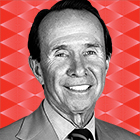This content is from:xinyabo体育app
2015 All-America Research Team: Economics, No. 2: Ed Hyman
Following that unequaled run of 35 years at the top, the Evercore ISI chairman, who sold his ISI Group firm to Evercore Partners last October, slips to No. 2.


Total appearances: 40
Analyst debut: 1976
Money managers and buy-side researchers named All-America Research TeamHall of Famer埃德•海曼the best economist on Wall Street from 1980 through 2014. Following that unequaled run of 35 years at the top, theEvercore ISIchairman, who sold his ISI Group firm to Evercore Partners last October, slips to No. 2. Nonetheless, loyalists continue to value his numbers-driven coverage. “Ed’s weekly economic reports are filled with charts and data points that provide a dashboard view of key global trends that you can review in less than ten minutes,” one admirer remarks. “His opinions never turn stale — he goes wherever the data take him.” Keeping an eye out for a potential bubble and/or downturn, Hyman, 70, is cataloging the competing forces driving performance. Over the past six years, U.S. output has been expanding, albeit at a subdued pace of about 2 percent, even as employment has been increasing at a rate of roughly 200,000 jobs per month, he points out. On the policy front, even if the Federal Reserve were to tighten interest rates by as much as 75 basis points, hiking its benchmark from near zero, “that’s still pretty low,” he says. Consumers are benefiting from declining prices for apparel and gas — and most important, he contends, household formation has sustained an accelerated growth rate since shooting up by 1.7 million in the fourth quarter of 2014, compared with the year-earlier period. “People turning 25 are getting jobs, paying rent and buying houses. They’re purchasing cars, getting married and having kids. Demographics are the basis for everything,” the economist insists. At the same time, however, the dollar is strong, share prices of high-quality names are dear, and bellwether items such as art and housing are expensive, he notes. Moreover, he sees reason for concern in the “lack of growth in S&P 500 earnings,” as well as a potential hard landing in China and relapse in Greece. Given all these considerations, and barring an “exogenous” wild card like a Donald Trump presidency or a “China implosion,” he reckons that a recession in the U.S. is five years off. “Slow and steady wins the race,” Hyman sums up.
